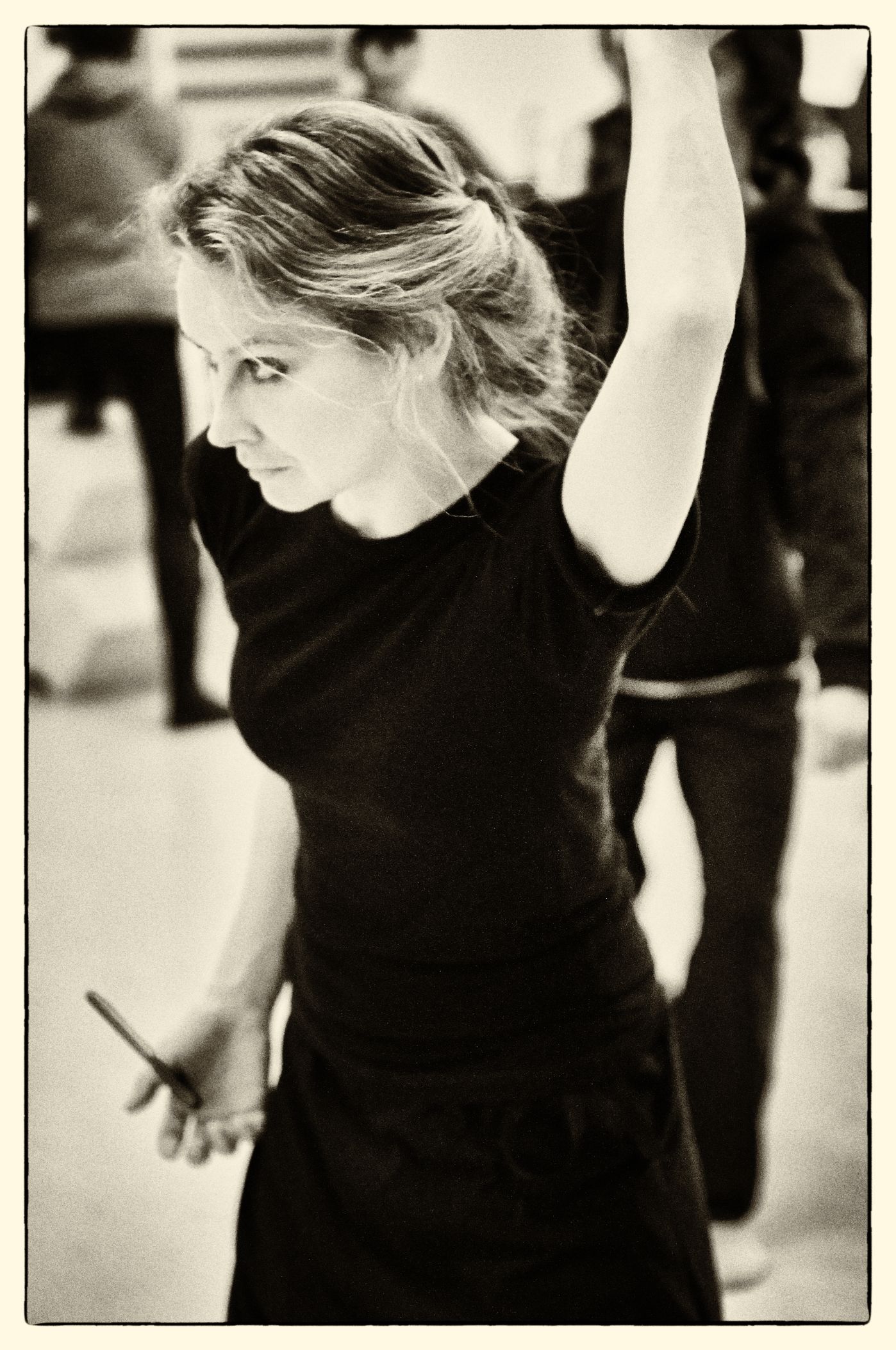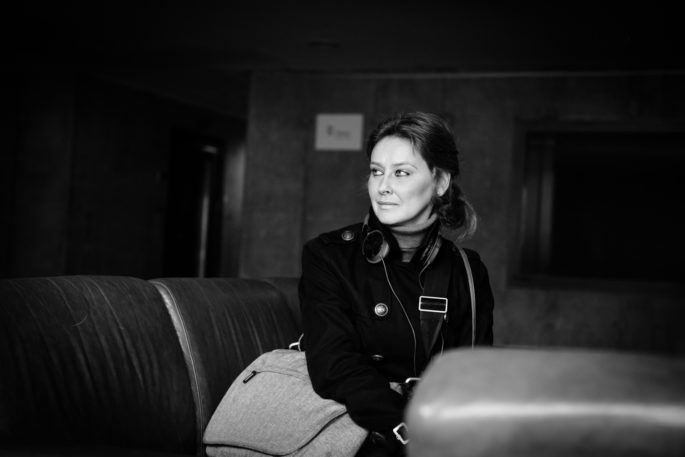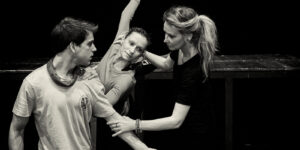Alena Pešková: "We are not limited by unfreedom, but by the lack of craft..."
Dance news, 13.1. 2016 /Barbora Truksová/
On Saturday, 16 January 2016, the ballet will premiere in Pilsen The Rite of Spring. Alena Pešková, otherwise the head of the Liberec ballet company, took on the challenging task of creating a ballet for the company based on Stravinsky's opus. Consecration, Pilsen or Liberec, but also about the philosophy with which he approaches his work.
Your career as a dancer is also connected with Plzeň - either as a member of the company or as a permanent guest - and you have created several ballets for the company in the past. How do you remember your past collaborations?e?
Actually, I don't even remember, I don't feel like it was interrupted. I joined Pilsen right after school, I got many wonderful opportunities. I continued working with them even after I decided to go freelance. Above all, I started choreographing there, at first smaller, for opera companies or musicals... and eventually my first full-length ballets.
Which roles or productions were groundbreaking for you?
As far as roles go, then definitely Lady with camellias, Lady Macbeth or Frederika in Little Mr. Friedemann. We founded the independent dance association Post Festum, which was dedicated to work outside the theatre. The first full-length ballet that I really consider my own was Marisha. Before that, I did Trnka's Gardenbut it was directed by Mr. Wednesday and the libretto was already written. V Marys I had it all in my hands.
Who was the biggest influence on you as a choreographer?
It cannot be denied that Libor Vaculík had the biggest influence on me as a dancer. As a choreographer, it made me a bit crazy because I couldn't get rid of his movements - muscle memory is something crazy! I had to go through several workshops with myself to get rid of it and to find my own vocabulary. As for my role models, I take inspiration more from non-dance spheres - visual arts, film, literature.
The premiere of your The Rite of Spring - the cornerstone of all choreographers. Do you have a favourite version?
I have seen many versions, some I liked more, some less..., the libretto is very important for me. I've adapted mine a lot, I don't just use the music Consecration. The first part is based on Stravinsky's Apollona Musagète. As is my custom, we find ourselves on two planes. I like alienated theatre, which destroys the illusion of theatricality. The first part takes place in the space-time of Stravinsky, or rather the composer. When I was going through OrdainedI was fascinated by the frequent use of the word "victim". Even an artist is a victim - of his Muse, of a woman. Will a composer, by the time he has a name, be willing to create a work that perhaps no one else will understand? Sacrifice his reputation and financial security, perhaps even his health, just for the truth of music? The composer gives the Muse the nod, and the society that has been sympathetic to him up to that point is horrified and unwilling to accept. But that gradually changes and he begins The Rite of Spring. The sophisticated company becomes a bunch of heathens and shows him what he has actually composed. And the composer can enter and show them what will happen if they desecrate existence on Earth. At times I was sickened by the bullying against the victim, intensified by the alienation. The victim is a dancer who wants to leave. But the others won't let her go - they are too immersed in the game and need their victim. But I didn't want to let it end tragically, so I end with the apotheosis of love.
Did you do the positive ending for the sake of the audience, so they wouldn't leave the theatre too depressed?
Not really, I needed that myself. I'm an optimist and an idealist. I believe that even human sacrifice can lead to something good, to the awakening of society. Only through personal sacrifice can a person change.
Where did you get the inspiration for this concept? The inner struggle is a frequent leitmotif of your productions.
The theme of the individual versus society is very important to me, as is the story. I often have this motif of alienation in my productions - it comes from my life attitude. In my work and in my life I am closer to Brecht than Stanislavsky. I don't think we should think of ourselves as "I", but as "he", in the third person. Only then can we look at ourselves from the outside and evaluate ourselves. I don't accept Stanislavsky's thesis that we should put ourselves into roles and think how I would experience things. On the contrary, I'm interested in how the hero would experience it. This detachment is terribly important for theatre and for life. Petr Zelenka, for example, works very well with a similar idea in his film The Karamazov Brothers. That's why I try to frame my productions with something. So that the viewer can say: "Ah, but it's not Romeo and Juliet, which was set many centuries ago. Romeo and Juliet does walk among us."
I lay in the score for a long time and couldn't find the key. Stravinsky helped me. Musical poeticswhich is now kind of my bible. It's a collection of the composer's lectures to music theory students at Harvard. It's very philosophical and soulful, and it goes into a lot of human experience.
How did you find it working with the current Pilsen ensemble, which has undergone quite a significant rejuvenation in recent years?
I have to give them huge praise, especially musically! Stravinsky is not at all simple, with perhaps 150 bar changes in 38 minutes. During the creation process I realized that I had to work with the music, but not copy it. It's so polyrhythmic and polymelodic in itself that it wouldn't make sense. So the dancers are in the same meter as the music, but not the same rhythm. Everyone has bought into this game and ignored what they hear in the foreground. On the other hand, in The Apollo's, where it is musically neoclassical, beautifully returns to a pure rhythm. The ensemble is young, it has great ambitions.
Is there a difference for you when you are a guest or when you create for your home, Liberec ensemble? How do you create in your company - do you create in the hall or do you come prepared?
That has changed a lot for me. Before, I used to lie in the score for half a year, I had everything carefully prepared and tested on myself. I knew what a dancer's body could do. Lately, however, I often collaborate with the composer Gabriela Vermelho, who has a completely different perception of time - I always tell myself that this is the last collaboration. But the result always convinces me to continue. She sends me the music at three o'clock at night, I get up at four and by ten I have to rehearse with the ensemble. Lately I find myself choreographing on the bus when I can't move. And ironically, I've discovered that this is the solution to the aforementioned muscle memory problem! When I can't move, I find it much easier to create. So now, even though I have my music long in advance, I prefer to get on the tram with my headphones and ride from terminal to terminal.
So by silencing the body, you get the freedom of the imagination?
Exactly, I am killing the body memory and muscle experience that is holding me back and working so negatively.
The premiere is coming up, what are your emotions?
Aside from the dancing, there are a few things I'm looking forward to, but also dreading. Particularly in terms of the set design - my brother Richard is doing the set design. The basis of the set is the object of the shot piano - we don't play with it too much, but it works as a symbol of Stravinsky's shot music. My brother has played incredibly well with the golden cuts - it's a tribute to Stravinsky, who worked in very closed forms and was a proponent of great unfreedom for the artist. I'm also concerned about the moment when the dancers manipulate the scattered grain, which is very effective but also quite painful and slippery. What the technicians will think of me when they clean it up, I don't want to think (laughs).
When you came to Liberec, you defined several goals you would like to achieve with the company - for example, the technical comparison of the dancers. Now you are there for the fifth year - have you been able to achieve your goals?
Partly, yes, but I had to retreat from a lot of things when I collided with reality. I wanted to work with people who would get used to my style and be comfortable working in it - and in some cases, I actually did. There hasn't been a significant turnover of the ensemble, there are still permanent contracts in place. Liberec is probably the last place where it worked for so long, I only managed to cancel it two years ago, but some contracts are still running out. At the same time, there are so few of us that only one cast is working. As disciplined as one can be, the lack of competition will always do its work. That's what I feel when I'm working for a larger ensemble where everyone is fighting to be in the front line. In Liberec, no one loses a role during the season. It's also harder for the dancers in that they can't look at other dancers and develop themselves further in the role through such comparisons. On the other hand, I can give more time to everyone. I don't take it as a negative or a positive, but as a fact that we have to work with.
Is there a ballet criticism in Liberec to provide feedback to the dancers?
In Liberec, criticism doesn't work at all. It's not that the journalists are not enlightened and deliberately ignore or despise the ballet, but they are afraid to write anything because they claim that there is no one who understands it enough to evaluate it. And there is not enough interest to invite someone knowledgeable to print the text. It's sad, because feedback is extremely important for both creators and audiences - both for evaluation and for the perception of theatre by people who don't otherwise go to it.
What are the specifics of the Liberec audience? And does it influence you when creating the dramaturgical plan?
This is a rather difficult question. I get good feedback from the audience on my choreography, but I realize that it's not the majority audience, but rather the die-hards who become fans and come to see the pieces over and over again. It's not a majority genre, though. Then I'll do The Nutcracker and it's crowded. I like to say that the classics are the biggest commerce in ballet. People come to see well-known titles - I'm not saying I don't like it, but because of the capacity of the company we always have to adapt, so even The Nutcracker is original. But I'm convinced that more people will go to see him than, say. Gazda's Edge, because it's a more demanding title, and today people go to the theatre mainly to have fun and don't want to burden themselves with difficult topics. If I were performing this title in Prague, I think the reception would be different - in Liberec there is a subscription service, which is mainly for an older and conservative audience. You have to make compromises, that's why we have The Nutcracker, Cinderellabut at the same time, I can make Gazda's Edge or Periphery.
 The Liberec ballet company is appreciated for reflecting local themes. Ota-Pavel-Rashka, Harald, Café Reichenberg. Was it your initiative or is it the direction of the whole theatre?
The Liberec ballet company is appreciated for reflecting local themes. Ota-Pavel-Rashka, Harald, Café Reichenberg. Was it your initiative or is it the direction of the whole theatre?
Harald had been in my head since I started the theatre - since I was at school, when they said "Liberec and dance"...he jumped me... Harald Kreutzberg. But then I got pregnant, so I couldn't do the production. At Rashkovs we agreed with Martin Dvorak. Focusing on local themes was more or less my idea, because I really like the idea of connecting the repertoire with what is close to the city. Now we are thinking about a medieval lord, a mysterious man of the type Fausta. But I haven't bitten through it yet.
Other choreographers are invited to Liberec, including dancers from the company, such as Marika Hanousková. How do you choose with whom to collaborate?
I'm not only the head of the ballet, but also the head choreographer - every year I have to choreograph at least one full-length ballet for the company, there used to be an operetta as well. At the moment I feel it's too much, that the company needs more choreographers. While it's great that they maintain my style, both sides know that next fall we'll be creating together again, not taking a break from each other. I choose the other choreographers intuitively, sometimes more successful, sometimes less so. It's a risk, of course, now we'll be working with Sylva Nečasová, it will be her first full-length ballet. But where else should choreographers start but in the region? I really like the concept she came up with, as well as her shorter pieces. Getting a choreographer for a full-length ballet who is also a director and often a librettist is quite challenging in our conditions.
We are sitting in Café Nona and in a few hours the premiere performance of the second generation of DekkaDancers will take place. Are you following the young choreographers?
I'm trying. I'm going to go tonight, too. But I'm an advocate of full-length, and especially narrative ballets - they can be abstract, but there should always be catharsis. Someone said that the crisis of modern art is that it doesn't have a timeline - you can stop it in the middle and it doesn't hurt anyone - some pseudo-philosophy can always be put on it. I don't like that. But I must point out that this is not the case with DekkaDancers! I've been following their work for a long time, and I usually enjoy it as one of the exceptions in our territory, that is, as far as the "short" stuff is concerned. And that's the point - the dancers have perfect control of their bodies and the choreographers know exactly what they want to say and how.
You have been quite critical of alternative dance projects.
I don't have a problem with dancers lounging on stage or just crossing the stage, but there has to be a sense of background behind it that they know the craft. When Baryshnikov walks across the stage, the audience falls over not because they know it's Baryshnikov. Kandinsky, on the other hand, could afford to discard the craft and paint two lines because he had perfect command of the technique and you could feel it even in those two lines. Even in a minimal movement something can be created, even if it is a movement bordering on the civilian. That's all right. But yes, as a choreographer I need to be able to build something from classical, neoclassical, contemporary or tap. But it's only when I can do that that I can afford to throw it all away. The company always wants to break some boundaries, to dance on the ruins of something I haven't built. But one should tear down what one has built oneself. We are not bounded by unfreedom, but by lack of craft. Dancers must embrace all the hard work so that the industry does not lose its credit. But it's not just about dance, it's about contemporary art in general. Even a conceptual artist should be able to paint a figurative painting - and if they despise it so much, then maybe burn it and tear it up.




Comments are closed.